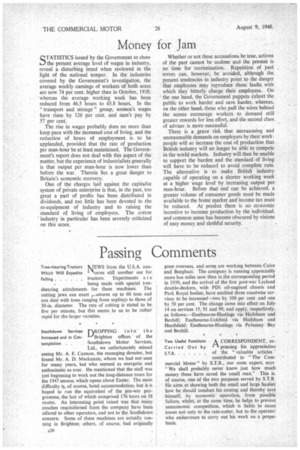Money for Jam
Page 22

If you've noticed an error in this article please click here to report it so we can fix it.
STATISTICS issued by the Government to show the present average level of wages in industry, reveal a disturbing trend when reviewed in the light of the national temper. In the industries covered by the Government's investigation, the average weekly earnings of workers of both sexes are now 74 per cent. higher than in October, 1938. whereas the average working week has been reduced from 46.5 hours to 45.8 hours. In the "transport and storage" group, women's wages have risen by 126 per cent. and men's pay by 57 per cent.
The rise in wages probably does no more than keep pace with the increased cost of living, and the reduction of hours of employment is to be applauded, provided that the rate of production per man-hour be at least maintained. The Government's report does not deal with this aspect of the matter, but the experience of industrialists generally is that output per man-hour is now lower than before the war. Therein lies a great danger to Britain's economic recovery.
One of the charges laid against the capitalist system of private enterprise is that, in the past, too great a part of profits has been distributed in dividends, and too little has been devoted to the re-equipment of industry and to raising the standard of living of employees. The cotton industry in particular has been severely criticized on this score. Whether or not these accusations be true, actions of the past cannot be undone and the present is no time for recrimination. Repetition of past errors can, however, be avoided, although the present tendencies in industry point to the danger that employees may reproduce those faults with which they bitterly charge their employers. On • the one hand, the Government puppets exhort the public to work harder and save harder, whereas, on the Other hand, those who pull the wires behind the scenes encourage workers to demand still greater rewards for less effort, and the second class of adviser is more successful.
There is a grave risk that unreasoning and unreasonable demands on employers by their work people will so increase the cost of production that British industry will no longer be able to compete in the world markets. Industry will then be unable to support the burden and the standard of living will have to be reduced to avoid complete ruin. The alternative is to make British industry capable of operating on a shorter working week at a higher wage level by increasing output per man-hour. Before that end can be achieved, a greater volume of consumer goods must be made available to the home market and income tax must be reduced. At present there is no economic incentive to increase production by the individual, and common sense has become obscured by visions of easy money and slothful security.




































































